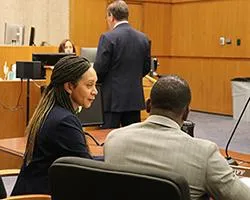Pretrial services officers serve as the front door to the criminal justice process in the federal Judiciary. Located in each U.S. district court, pretrial services officers work with people who are charged with federal crimes and awaiting trial, helping to ensure defendants return to court for scheduled appearances and do not pose a danger to the community.
Investigation
When someone is charged with a crime in the federal system, a judge must determine whether that person will be released or detained pending trial. The decision is a critical moment in the criminal justice process. Judges must balance a person’s presumed innocence and right to freedom under our constitutional system with the imperative of protecting others.
To aid a judge’s decision, the pretrial services officer conducts an investigation to gather and verify information about the defendant’s residence, family ties, employment history, criminal history if one exists, financial resources, and health, including any mental health or substance use issues. In addition, the officer may work with the defense attorney and assistant U.S. attorney in the case to create a suitable release plan. At this early phase, a defendant is presumed innocent. The pretrial services officer does not discuss the alleged crime or the defendant’s guilt or innocence and does not give legal advice or recommend an attorney.
Pretrial Risk Assessment
The Pretrial Risk Assessment (PTRA) is an actuarial data tool that measures a defendant’s risk of missed court appearances, or rearrest for another crime, or the likelihood of violating court-imposed conditions of release. Incorporating data from hundreds of thousands of past cases, the PTRA tool uses algorithms to predict risk, based on factors such as criminal history, education and employment, residential ownership, citizenship status, and substance use history.
Using the PTRA in combination with their professional judgement, pretrial services officers make informed recommendations to judges about release or detention and supervision strategies.
Report for the Judge

Information gathered in the investigation is summarized by the pretrial services officer in a report that the judge relies on to make an informed release decision. The pretrial report addresses the defendant’s likelihood of success if released to the community and includes the officer’s recommendation for release or detention pending trial. If the recommendation is to release, the officer may recommend that the court impose certain conditions tailored to the individual.
For example, the officer might recommend that a defendant participate in drug testing and treatment, secure employment, or be placed on location monitoring. Conditions may prohibit the possession of guns or other weapons, contact with victims or witnesses, or association with certain people. The court may impose a curfew or conditions to restrict travel. The Bail Reform Act of 1984 requires courts to consider the least restrictive conditions needed to ensure a defendant’s appearance in court and the safety of the community.
Supervision

Pending trial, an individual might be released on their own recognizance. If the court orders a defendant to be supervised pending trial, pretrial services officers perform that function to help ensure compliance with the conditions set by the court. They maintain contact with defendants through various methods, including phone calls, videoconferences, and face-to-face meetings, and in various locations, such as the pretrial services office or the defendant’s home or workplace. Throughout the course of supervision, officers may also communicate with family members, employers, or treatment providers. As a condition of release, defendants may be referred to additional services, such as mental health or substance use disorder treatment programs.
Pretrial services officers are involved at every critical step in the court’s decision-making before a trial begins. They play a vital role in upholding liberty, preserving public safety, and ensuring the fair administration of justice.
